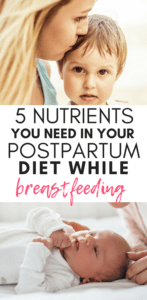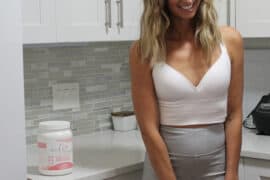Keeping both you and your baby healthy while breastfeeding requires a proper meal plan and some guidance. If you would like a step-by-step program to help you lose weight safely, check out all our courses, programs, challenges, & recipe book.
Every new mama should embark on a postpartum diet plan while breastfeeding because a postpartum diet plan will encourage and promote choosing nutrient-dense foods! I am a big advocate of a postpartum diet plan that focuses specifically on nutrients for breastfeeding and healing after birth. Our bodies need nutrients to function properly, and a postpartum diet plan while breastfeeding is a great way to ensure you are eating all the important nutrients you can! There are a lot of nutrients our bodies require while healing postpartum and breastfeeding. I am going to break down five important ones. My program is super helpful if you need help following a plan and putting together meals to ensure you are getting enough of the right nutrients.
I created a postpartum diet plan for breastfeeding mamas that is way more than just a diet plan. It is a healing program that touches all areas of postpartum healing, nourishment and strength. I highly recommend following a postpartum recovery program to ensure your core and pelvic floor get the attention it needs and your body gets the nutrients it needs to recover and produce plenty of breast milk.
I am SO EXCITED to share that I am launching Milk Dust, the only protein powder that pumps up your milk supply with a special lactation blend while also curbing sugar cravings!! There are no other clean, super nutrient-dense protein powders like this, and I would love for you to sign up for the pre-sale lists, where I am offering the first batch at a discount!!
Let’s get into the five nutrients you need in your postpartum diet plan while breastfeeding:
Omega-3 Fatty Acids:
You can some daily pills like these. I find that is the easiest way to get Omega-3 as a busy new mama because I don’t always have the time to cook up some salmon. I do have an amazing mustard salmon recipe in my program! Omega-3 fatty acids are important because those fats get into your breast milk and are passed to the baby. It has been shown that women taking DHA have higher breast milk levels, meaning you can help your baby get more by supplementing!
Probiotics:
These are the good bacteria in your gut that help digest food and fight off the bad bacteria. Your baby needs this too! Adding good bacteria into your diet can help ensure it is passed through to the baby. The latest studies have shown that probiotics can travel from the mother’s gut to breast milk. This is a big deal! Probiotics improve your immune system, as well as babies, which is very helpful during the first few weeks of life! You can take a supplement or add Sauerkraut, Greek yoghurt, Kefir and even some dark chocolate!
Antioxidants:
Antioxidants are found in many plants, but most commonly in berries. I find those the easiest to eat postpartum; they are super important to help the body heal from giving birth, vaginally or c-section. The body needs antioxidants to help reduce inflammation and repair itself. Antioxidants are also found in breast milk, which is super important to a baby’s health to prevent sickness and disease. I love this powder to help me get all my greens in at once, but berries, spinach and dark-green veggies are great sources.
Protein:
Protein is super important for your postpartum diet while breastfeeding. Protein will help your cells repair, heal and regenerate new cells. Protein is the building block of new cells and skin. It will also support your muscles as they repair from being stretched or torn. The cleaner the protein source, the better to ensure your postpartum body gets the most out of the protein possible. I love a protein shake for quick and easy nutrition and light and tasty proteins like ground turkey and eggs. Protein will also help you maintain your muscle as you lose the baby weight.
Vitamin C:
This vitamin is fantastic for keeping your immune system strong, your bowels moving, and skin healthy. Vitamin C will help you repair the torn and stretched skin during pregnancy and birth and keep you from getting sick with a new baby. Our bodies can’t make vitamin C, so we need to ensure we take it as a supplement or eat foods like red peppers, strawberries, berries and kiwi. Lawrence and Lawrence in, Breastfeeding A Guide for the Medical Profession, 2015 state that within half an hour of receiving vitamin C supplements, the amount of vitamin C increased in their breast milk. This means that you can help your baby get vitamin C too!
These are 5 nutrients that need to be a part of your postpartum diet plan while breastfeeding! If you aren’t sure where to start, feel free to check out my program, which is full of clean-eating and nutrient-dense meals to help your body produce lots of breast milk while losing the baby weight.
If you haven’t yet, check out all our courses, programs, challenges, & recipe book!




Comments are closed.